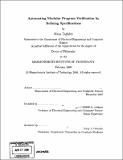Automating modular program verification by refining specifications
Author(s)
Taghdiri, Mana, 1979-
DownloadFull printable version (10.45Mb)
Other Contributors
Massachusetts Institute of Technology. Dept. of Electrical Engineering and Computer Science.
Advisor
Daniel N. Jackson.
Terms of use
Metadata
Show full item recordAbstract
Modular analyses of software systems rely on the specifications of the analyzed modules. In many analysis techniques (e.g. ESC/Java), the specifications have to be provided by users. This puts a considerable burden on users and thus limits the applicability of such techniques. To avoid this problem, some modular analysis techniques automatically extract module summaries that capture specific aspects of the modules' behaviors. However, such summaries are only useful in checking a restricted class of properties. We describe a static modular analysis that automatically extracts procedure specifications in order to check heap-manipulating programs against rich data structure properties. Extracted specifications are context-dependent; their precision depends on both the property being checked, and the calling context in which they are used. Starting from a rough over-approximation of the behavior of each call site, our analysis computes an abstraction of the procedure being analyzed and checks it against the property. Specifications are further refined, as needed, in response to spurious counterexamples. The analysis terminates when either the property has been validated (with respect to a finite domain), or a non-spurious counterexample has been found. Furthermore, we describe a lightweight static technique to extract specifications of heap-manipulating procedures. These specifications neither are context-dependent, nor require any domain finitizations. They summarize the general behavior of procedures in terms of their effect on program state. They bound the values of all variables and fields in the post-state of the procedure by relational expressions in terms of their values in the pre-state. The analysis maintains both upper and lower bounds so that in some cases an exact result can be obtained.
Description
Thesis (Ph. D.)--Massachusetts Institute of Technology, Dept. of Electrical Engineering and Computer Science, 2008. Includes bibliographical references (p. 205-211).
Date issued
2008Department
Massachusetts Institute of Technology. Department of Electrical Engineering and Computer SciencePublisher
Massachusetts Institute of Technology
Keywords
Electrical Engineering and Computer Science.